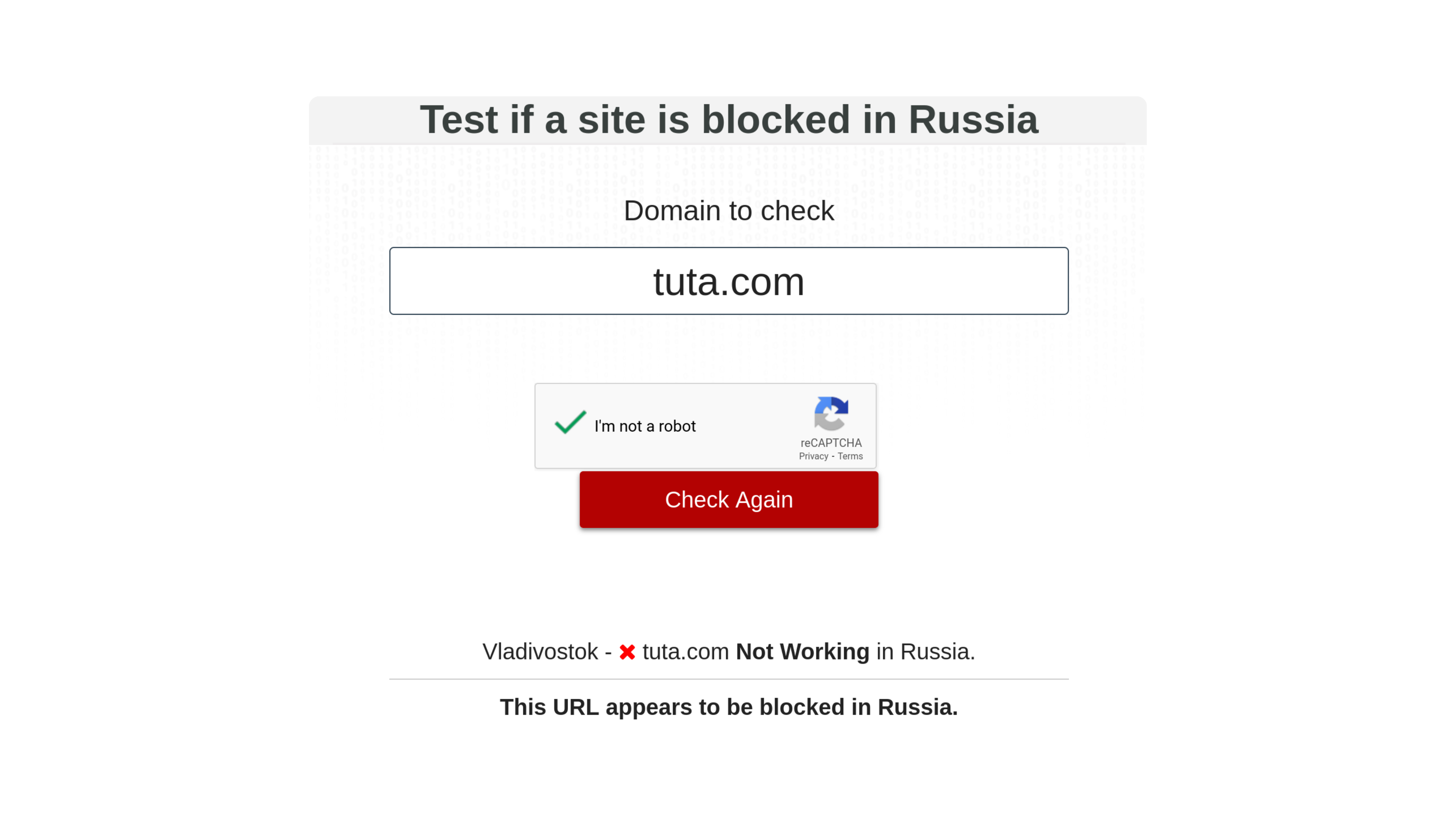Tuta Mail、Signal、WhatsAppのような暗号化アプリのブロッキングに反対するロシアへの公開書簡
Tuta(nota)は2020年に、Signalは2024年にロシアでブロックされ、次はWhatsAppだ。我々は、ロシアが中国のような監視国家を建設するのを阻止するために立ち上がっている。
ロシア当局は、昨年すでにSignalを、2020年にはTuta Mailを禁止したのに続き、WhatsAppをブロックすることで暗号化通信の取り締まりをエスカレートさせている。さらに、ロシアで販売されるすべての携帯電話には、ロシア市民をコントロールすることだけが目的であるとして激しい批判を浴びているロシア製アプリ「マックス」があらかじめインストールされていなければならない。
Roskomnadzorによるこれらの行為は、言論の自由、情報へのアクセス、プライバシーなど、国際的に認められた人権を直接侵害するものである。
この取り締まりは、グローバルで安全なアプリを国が管理する代替アプリに置き換えることで、「デジタル主権」を押し付けようとするロシアの戦略の一環である。
ロシア当局は現在、暗号化されたアプリの検閲を回避するために不可欠なツールであるVPNもブロックする計画だ。これにより、ロシア市民は安全な通信のための選択肢をほとんど失うことになる。このような制限により、ジャーナリスト、活動家、内部告発者を含む何百万人もの人々が、プライバシーと情報への安全なアクセスの権利を剥奪され、危険にさらされている。
ロシアは2020年からTuta(nota)をブロックしている
OONIエクスプローラー(オンライン検閲を実証するツール)が示すように、ロシアの一部では2020年からツタメールがブロックされている。世界有数の暗号化メールプロバイダーであるツタノータ(現ツタメール)も、ロシアの活動家が提供するブロックされたサイトの登録リストに掲載されている。
暗号化に対する行為
暗号化された通信は、ロシアのような権威主義的な政府にとってはとげとげしいものだ。暗号化は、政府やその諜報機関が市民を盗聴したり、反対派をコントロールしたりすることを不可能にする。現在、Tuta MailやSignal、その他のアプリがブロックされているのは、ロシアにおける暗号化と機密通信に対する行為である。
Tuta(nota)はエジプトでも2019年10月からブロックされている。
TorまたはVPN経由でのアクセス
ロシアとエジプトで安全な通信を必要とする人々は、TorブラウザやVPNを使用することで、Tuta Mail、Signal、その他のブロックされたアプリやウェブサイトにアクセスすることができる。しかし、当局もこれらのサービスをブロックし始めているため、VPNを使用する選択肢はますます制限されている。
私たちTutaは、暗号化されたアプリのブロッキングを非難する。これはロシア市民に対する検閲の一形態であり、ロシア市民はオンラインにおけるもう一つの安全な通信チャネルを奪われているのだ。Tutaでは、ロシアやエジプトのような権威主義的な国でも、そして特に、オンラインにおけるユーザーのプライバシーの権利のために戦います。
検閲と言論の自由
オンラインでの検閲は、しばしば言論の自由を阻止するために用いられます。多くの民主主義国では、言論の自由は憲法によって保護されている。例えばドイツやアメリカがそうだ。これらの国では、国家権力がオンライン上の情報やコミュニケーション・ツールへのアクセスを制限することは、不可能ではないにせよ、非常に困難である。
他の国々、たとえば中国、ロシア、エジプトでは、国家権力が望まない情報やコミュニケーション・ツールへのアクセスを止めたり制限したりすることはよくあることだ。しかし、たとえ一般的であっても、私たちはそれについて黙っていてはなりません。
ロシアにおける暗号化を擁護するための公開書簡を下記よりお読みください!
ロシアにおける暗号化サービスのブロッキングに反対する公開書簡
以下に署名した団体、組織、個人は、昨年のSignalのブロッキングに続き、WhatsAppのようなエンドツーエンドの暗号化通信プラットフォームへのアクセスをブロックしようとするロシア当局の取り組みがエスカレートしていることについて、緊急の懸念を表明するために書簡を送ります。連邦通信・情報技術・マスメディア監督局(Roskomnadzor)によるこれらの措置は、意見・表現の自由、情報へのアクセス、プライバシーの権利など、国際的に認められた人権を侵害するものです。
暗号化されたサービスはライフラインであり、国連や国際的な人権専門家によって、安全なコミュニケーションと民主的な参加を実現する重要な手段として認識されている。暗号化されたサービスは、ジャーナリスト、人権擁護者、活動家、そして一般の人々が、監視、検閲、報復を恐れることなくコミュニケーションすることを可能にします。これらのサービスへのアクセスを排除することは、プライバシーと表現の自由に対する基本的権利を損ない、安全なコミュニケーションのために暗号化に依存している何百万ものユーザーの安全を脅かす。
これらの最新の制限は、デジタルサービスの提供に対してますます不適切で過剰な権限を主張することで、「デジタル主権」を行使しようとするクレムリンによるより広範な取り組みの一環であり、同時に、国家が管理するプラットフォームの開発と依存を支援するものでもある。グローバル・サービスの制限やブロックに加え、ロシア政府は国内で販売されるすべての携帯電話やタブレット端末に、「マックス」と呼ばれる政府支援の非暗号化メッセンジャーをプリインストールするよう命じている。政府サービスと統合され、国営企業VKによって立ち上げられたマックスは、エンドツーエンドの暗号化サービスと同じ保護を提供することはできない。
同様に、ロシアは多くのバーチャル・プライベート・ネットワーク(VPN)の使用をブロックしている。VPNは、検閲を回避しプライバシーを保護することで、個人の権利を実現するために不可欠で合法的な手段を提供するツールである。暗号化された通信プラットフォームとVPNの両方を制限することで、ロシアの人々は安全な通信のための選択肢が極めて少なくなる。
この文脈で、我々は
- ロシアがエンド・ツー・エンドの暗号化されたメッセージング・アプリケーションをブロックし、プライバシーと表現の自由のために同レベルの保護を与えない暗号化されていない代替手段を強制的にプリインストールしていることを非難する;
- 情報へのアクセスを可能にし、安全な通信を促進し、不法な監視に抵抗する上で、暗号化とVPNが極めて重要であることを再確認する。
- 企業、市民社会、およびマルチステークホルダー・イニシアティブによる、ロシアおよび世界中の人々のための暗号化通信サービスへのアクセスを維持・拡大するための努力を支援する。
- このような慣行を常態化させることの世界的リスクを認識し、他の司法管轄区において同様の制限的措置を採用する圧力に人々が抵抗できるよう支援することにコミットすること。
ロシアにおける暗号化サービスのブロッキングは、非暗号化国家管理アプリの強制展開と相まって、孤立した規制行為ではなく、人権に対するより広範なキャンペーンの一環として理解されるべきである。このような戦術に異議を唱えなければ、他の場所でもデジタル権威主義の危険な前例となる危険性がある。国際社会は明確な決意を持って対応しなければならない。自由でプライベートかつ安全なコミュニケーションは特権ではなく、あらゆる場所で守られるべき基本的権利なのだ。
私たちは、声を封じられようとしているロシアの人々と連帯し、デジタル時代の自由の不可欠な柱として、暗号化、VPN、そして開かれたインターネットを擁護し続けます。
敬具
市民社会団体
政府における原則的行動のためのアドボカシー
アフリカ農村インターネットと STEM イニシアチブ - AFRISTEMI
記事19
チェイン
民主主義とテクノロジーのためのセンター
オンライン安全と自由のためのセンター
電子フロンティア財団(EFF)
エメラルド・オニオン
暗号化擁護評議会
ファイト・フォー・ザ・フューチャー
グローバル・ネットワーク・イニシアティブ
グローバル・パートナーズ・デジタル
人権ジャーナリスト・ネットワーク・ナイジェリア
検閲に関する指標
インターネット協会カタルーニャ支部 (ISOC-CAT)
JCA-NET(日本)
LGBTテック
監視技術監視プロジェクト(S.T.O.P.)
サクセス・ブリッジ地域開発財団
Torプロジェクト
世界倫理データ財団
ザイナ財団
企業および業界団体
ノルド・セキュリティ
セキュアクリプト
ツタメール
サイバーセキュリティの専門家および学術関係者*:Jordi Domo-Pascual, Universatat Politènica de Catalunya (UPC Barcelona).
ジョルディ・ドミンゴ=パスカル教授、カタルーニャ工科大学(UPC BarcelonaTECH)
ソフィア・セリ、ブレイブ/ブリストル大学
リアナ・プフェフェルコーン(スタンフォード大学
サンジャナ・ハットトゥワ博士
ジャン・リニス=ディンコ博士
プリーティ・カムラ博士
ヴィヤラ・サヴォヴァ、EUCI/ユニビット
*所属は識別の目的のみのために表示されています。


